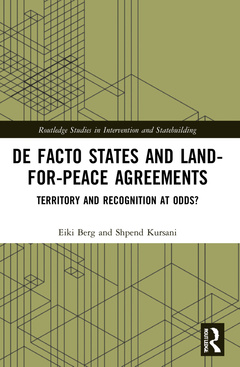De Facto States and Land-for-Peace Agreements Territory and Recognition at Odds? Routledge Studies in Intervention and Statebuilding Series

This book presents an analytical framework which assesses how 'land-for-peace' agreements can be achieved in the context of territorial conflicts between de facto states and their respective parent states.
The volume examines geographic solutions to resolving ongoing conflicts that stand between the principle of self-determination (prompted by de facto states) and the principle of territorial integrity (prompted by parent states). The authors investigate the conditions under which territorial adjustments can bring about a possibility for peace between de facto states and their parent states. It does so by interrogating the possibility of land-for-peace agreements in four de facto state?parent state pairs, namely Kosovo?Serbia, Nagorno?Karabakh?Azerbaijan, Northern Cyprus?Republic of Cyprus, and Abkhazia?Georgia. The book suggests that the value that parties put on land to be exchanged and peace to be achieved stand at odds for land-for-peace agreements to materialise. The book brings theoretical and empirical insights that open several avenues for discussions on the conservative stance that the international community has held on territorial changes in the post-1945 international order.
This book will be of much interest to students of statebuilding, state formation, secessionism, political geography, and international relations.
Introduction 1. Sovereignty contestations and emergence of de facto states 2. Territorial aspects of conflict settlements and the recognition conundrum 3. Bringing land-for-peace in the study of de facto states: An analytical framework 4. Lessons from the past: Land-for-peace in the Arab–Israeli conflict 5. Kosovo–Serbia land swap under mutual recognition 6. Exchanging occupied territories for a mutually recognised status of Nagorno-Karabakh 7. Territorial adjustments in Northern Cyprus: An accepted slice of an unaccepted chunk 8. The status of the Gali region in Abkhazia: A non-starter for negotiations Conclusion
Eiki Berg is Professor of International Relations at the University of Tartu, Estonia.
Shpend Kursani is Lecturer at the Institute of Political Science, Leiden University, The Netherlands.
Date de parution : 09-2023
15.6x23.4 cm
Date de parution : 12-2021
15.6x23.4 cm
Thèmes de De Facto States and Land-for-Peace Agreements :
Mots-clés :
De Facto States; land-for-peace agreements; Uti Possidetis Iuris; recognition; Self-determination Claim; Israel-Palestine; Turkish Cypriots; Kosovo; Territorial Adjustment; Abkhazia; Northern Cyprus; Karabakhi Armenians; Greek Cypriot; Karabakh War; Land Swap; Border Correction; Human Suffering; Turkish Cypriot Leadership; Gali Region; OSCE Minsk Group; Georgia’s NATO Membership; Lachin Corridor; Inguri River; Minsk Group Co-chairs; Azerbaijan SSR; NATO Air Campaign; EU’s Lack; Kosovo’s Territory; Madrid Principles; EU’s Periphery



